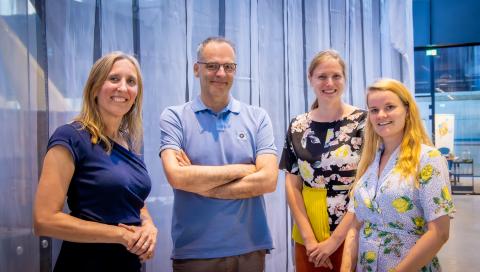Collaborating on Digital Health and Mental Wellbeing
How can digital tools contribute to mental wellbeing? What challenges and opportunities can be found in practice and how can research contribute to overcome and strengthen them? The kick-off symposium for the University-wide Academic Collaborative Center for Digital Health and Mental Wellbeing, which took place on the 13th of June, brought societal partners and researchers from Tilburg University together. Saar Hommes (post-doctoral researcher at the Center) provides an update on what happened at the LocHal that afternoon.
Society and Science
The Academic Collaborative Center, led by prof. Inge Bongers and prof. Emiel Krahmer, bridges between science and society. During the kick-off symposium attendees were representatives from mental healthcare organisations, app-develpers, primary and secondary care, health care insurance online platforms and data-research centra. At the event they were grouped with researchers from various disciplines at Tilburg University, such as ethics, psychology, epidemiology, communication, law, data science, language studied, statistics and medical sciences. Jointly they were brainstorming and discussing important themes that can kick-start the collaboration-agenda of the Academic Collaborative Center for Digital Health & Mental Wellbeing.
Digital tools: what should be improved?
Despite the potential that digital tools offer, it is important to understand its pitfalls. During the symposium, participants discussed what hurdles they come across in their work and a variety of input had arisen. The importance of co-creation and reaching those with lower health-literacy or socio-economic status was mentioned. For how can you ensure that not solely “the worried well’s” needs are being met? To reduce the pressure on (mental) healthcare, it is also important that digital communication can replace part of the care work rather than only complement the status quo and it is important to avoid a situation where different parts of the healthcare system have to re-invent the wheel. The long-term (side)effects of eHealth needs to be understood better and how digital tools can become part of routine work. It is also unclear who is responsible for the quality and maintenance of applications. And though more data is available, clarity is required on its quality and how this data can be clearly communicated to a mixture of audiences.
To summarise; partner organisations and researchers part of the Academic Collaborative Center for Digital Health and Mental Wellbeing won’t get bored in the years to come! Lots of ideas have been contributed in the discussion to further develop in co-creation.

From left to right: Prof. Inge Bongers (Professor in Sustainable Innovation for Mental Health and the Center’s Academic Lead), Prof. Emiel Krahmer (Professor Communication, Cognition and Computation and the Center’s Academic Lead), Esther van Vliet (the Center’s projectmanager) and Saar Hommes (postdoctoral researcher at the Center).
What’s next?
After the summer, the collaboration-agenda will be shaped jointly with partner organisations like hospitals, GGz organisations, municipality and provincial governments, e-Health companies, technology developers, patient organisations, primary care, occupational health organisations, research institutions and health insurance companies. The input received during the kick-off symposium will be part of the groundwork for the next step. Thanks to all participants!
Do you want to become a partner or work for the Academic Collaborative Center for Digital Health & Mental Wellbeing? Read more about the Academic Center, keep an eye on the vacancies at Tilburg University or contact the projectmanager Esther van Vliet.

